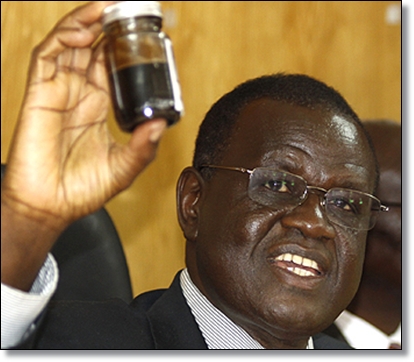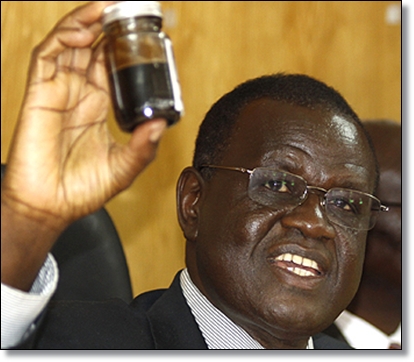Oil in Kenya: Fleeing the Dutch Disease

 |
|
Kiraitu Murungi, Kenya's Energy minister displays the oil find. Photo courtesy |
Government officials continue negotiating and signing off the right for oil exploration within the territorial boundaries of Kenya. This is going on unabated without anyone standing up to take stock and analyze the best way the country can get the most out of its oil wealth and even that originating from its neighbours, considering its strategic position in the region. A close analysis shows that Kenyans are sitting on wealth that is likely to be wasted by officers in the Energy ministry.The country’s petrochemical policies last revised in 1986 are archaic and have no place in our current operating environment. Negotiating for exploration rights without pro-country updated policy is tantamount to selling off citizens’ wealth to the dictates of foreign investing companies. This is unjustifiable, morally incongruent and smirks of sycophancy that cannot be excused.
Moratorium and strategy
While the small oil players deserve a right to existence, they need to tell us that they are in the country only for short-term gain. Their right for exploration is short lived and we expect little from them beyond the upstream processing. This is basically because they do not have the sufficient capacity to participate in downstream processing of the oil. Going by the practice in other countries, the firms currently hoodwinking the ministry of energy into signing exploration rights will most likely sell the rights to well established firms that have the required capacity for downstream processing. In selling the rights, they will definitely make a huge gain in comparison to what they paid the Energy ministry. Why can't we allow for competition and in the process get better deals?
A competitive process ensures that all the players in the petroleum business are allowed to express interest which is eventually evaluated vis a vis their experience in fulfilling stipulated country requirements. A deep consideration for a moratorium is a better way to go than the current practice of selling exploration rights in an ad hoc manner.
Legal and institutional frameworks
Frameworks define expected social, environmental, economic and legal foundations upon which explorations rights are based. By negotiating exploration rights without well thought out and updated frameworks, we are shooting ourselves on the foot and opening ourselves to wanton exploitation. Kenyans stand to lose more by allowing the Energy ministry to hurriedly process and give concessions for oil exploration without required policies or frameworks in place.
The neighbors’ oil
The oil from Kenya’s prospective oil rich neighbors of Uganda and the Republic of South Sudan is also a window of opportunity. Crude oil has no meaningful value unless it can reach the market. We can reach a consensus on how our neighbors can access the sea. Companies in the neighboring country can be allowed to construct a pipeline passing through Kenya. Out of this, the Kenyan government will charge transit fee for allowing the oil to pass through its territory to the port.
Companies in Kenya and the neighboring countries can agree to share in proportionate measure the cost of setting up the pipeline in their respective countries and also share in the revenue accruing therefrom. The second option requires a lot of compromise from both parties involved for there may be no clear equilibrium when considering the accruing gain or loss. The best option appears to be the first for it satisfies the requirement of the country in need for the market and also compensates Kenya for allowing usage of its territory for oil transiting.
Oil transiting history
In the 2009 when Russia went to war with Georgia, a militarily weak neighbor, Russia blocked its territory against oil transit from Georgia. Considering that Georgia relied on Russia as a transit route for its oil, the act of Russia blocking this oil flow destabilized Georgia economically. The shortest distance between Uberstan to the seaport is through Iraq. However, the hostility between these two countries makes it untenable for the shortest and cheapest route to be used. In the contrary, the longest route through Turkey is a more reliable and viable option for Uberstan.
In considering oil transiting as an alternative revenue earner for Kenya, we need to be sensitive to the regional stability and the extent to which we are willing to remain the friendly in the region. Remaining friendly has an advantage for it will assure us of continued prosperity through the oil wealth owned by our neighbors.
Ownership of oil wells
In the US, the individual land owner has rights over both the surface land and everything that is beneath it. A discovery of oil or gas in a farm therefore implies riches to the land owner. In Saudi Arabia which is a monarchy, the landowner has a right over the land while the Kingdom has exclusive access to everything beneath the land. The King has exclusive rights of access to the oil wealth that is in Saudi Arabia. The most interesting kind of ownership is found in Norway where both the born and the unborn have a right to the land and everything beneath it. No single person or the state can therefore claim exclusive ownership of the land. In Norway, everybody has access to the information on oil revenue and they also directly benefit from it. The disclosure mechanism from the government ensures no single entity has scope of enriching itself from the people's oil wealth.
The Norwegian practice is a classic case of accountability to the masses for a resource that they jointly own and directly benefit from. This is the practice that can be adopted in Kenya, but first, we need to open up an arena for public discussion and debate on what is suitable and workable in our situation.
The Kenya government ought to allow citizens to chart out what is best for them. The government must exercise extreme caution on oil wealth matters.
By Kenneth Onyango
The author kenjerry@yahoo.com is a chemical engineer, a CPA and a MBA in operations management currently working for a premier development financing institution covering 54 African countries. The views expressed in this memoir are his own personal thoughts and he takes responsibility for any error therein.
